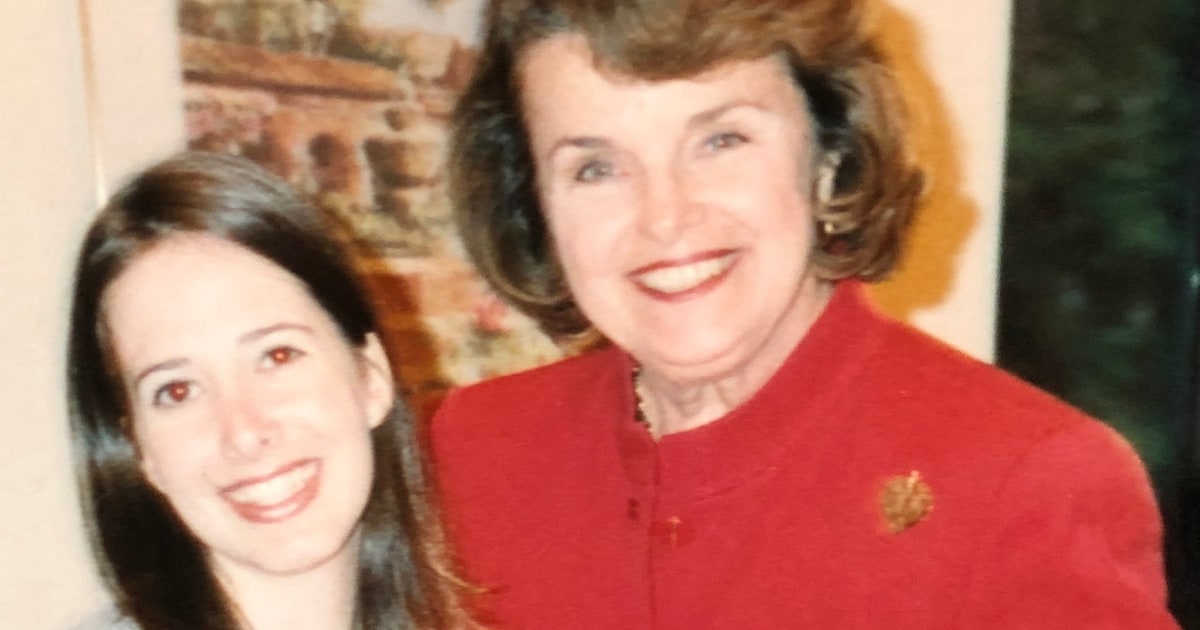
[ad_1]
For most people, the death of a 90-year-old, let alone one whose health had deteriorated rapidly and in public, would hardly be surprising. But when my husband called to tell me this morning that Sen. Dianne Feinstein passed away, my first reaction was shock.
And maybe that’s because, for me, Feinstein has been less a person than a pillar. Amidst the demographic shifts and electoral trends, she remained veritably permanent atop California politics, regal even, or maybe especially, in crises. From the assassination of a beloved colleague to the rushed confirmation of judges without character, preparation, or both, Feinstein was unflappable, sometimes to her critics’ dismay.
As one of her former staffers, I’ve written before about Feinstein’s precision, which was always on display, and her empathy, which was harder to see. Others have studied her alternately admirable and maddening cross-party comity and centrism. More recently, political writers have explored Feinstein’s lifelong institutionalism, suggesting her faith in government is quaint, if not foolish, in this moment. That Feinstein passed the day after the most recent GOP presidential debate — at times, a competition to see whose disdain for government was greatest — was sadly fitting.

What I find most notable about Feinstein’s life, however, are its constant contradictions. Steeped in privilege from childhood on, she often took her husband’s private jet to and from Washington. Yet she was an ardent environmentalist who pushed to protect California’s treasured redwoods and create new national parks across California.
She was a sometimes foe of immigration and civil rights advocates, including when she tried to find a middle ground to prevent more draconian GOP policies. Yet, as a fellow staffer told me, she was privately generous, inviting undocumented immigrants for Thanksgiving in her home.
She got her start in politics thanks to her physician father’s relationship with a well-placed patient: then-Gov. Pat Brown, a moderate who appointed her to California’s women’s prison and parole board. And yet, entirely on her own, she shrewdly forged alliances with folks like then-lawyer-on-the-move Willie Brown because, as a stroller-pushing mom in the early 1960s, she joined protests against racial discrimination in real estate offerings.
Like most of us, her best qualities — a fervent belief in herself and an unwillingness to yield — could also be her worst.
She insisted on her female staff wearing pantyhose in the office, a memory that makes me itch to this day, and the joke was that despite her trailblazing feminism, she was more forgiving — and often downright indulgent — of her male staff. Yet she was insistent that the abortion landscape of her youth — whisper networks, borrowed funds, and trips across the Mexican border — was wholly at odds with women’s equality. And according to a source close to Feinstein, she held onto her Senate seat, as well as her Judiciary Committee slot, out of fear that if she resigned, Republicans would block her replacement — and end Biden’s crusade to confirm the most racially and occupationally diverse pool of federal judges ever.
Like most of us, her best qualities — a fervent belief in herself and an unwillingness to yield — could also be her worst. One of my favorite photos of her shows her cornering her colleague Sen. Lisa Murkowski, arm pinned to the wall, to plead for her vote against Brett Kavanaugh’s confirmation to the Supreme Court. No doubt dozens of other senators found themselves similarly trapped over her three decades of service, often for the benefit of her beloved California. But sometimes, her refusal to budge was her worst quality, as the nation watched her visible, painful decline.
I last saw her about a decade ago at a college football game. If I had made an impression on her as a junior staffer in the late 1990s, it was gone by that day in 2013, when, with an infant carrier strapped to my chest, we were pushed together in an elevator in Stanford Stadium. Her eyes narrowed, and she gave me a once-over as if to say, “What kind of crazy person brings a baby to a football game?”
As usual, she wasn’t wrong. And when she strode out of the elevator, I told my preschool-aged daughter, “That woman made history. And once, she was my boss.”
[ad_2]
Source link